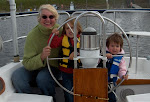"Working with objects, memories and energies of what's left behind,
this work is more about inclusion than exclusion."
The exhibit is rich and wild and wonderful and shows an exuberance that is the essence of its creator Stacey. Whenever I think of Stacey, I remember her enthusiasm and the twinkle in her eye. She is one of those people who make you feel warm and fuzzy when you meet her because she engages you with her vibrant being!
I met Stacey about 10 years ago when we were both part of an amazing experience: the Japan Fulbright Memorial Fund Scholarship Program. Stacey and I and 198 other teachers from all across the US were selected to spend two weeks in Japan as the guests of the Japanese government. The Foundation set up a group email account so that we could begin to connect. Before the trip in November of 2005 I created a spreadsheet to keep track of the many participants listing their hometown, the subject and age level they taught and any other information that they had divulged in the group emails. (I had been overwhelmed by the variety of emails and wanted some way to categorize the wealth of information about these people with whom I would be sharing this amazing experience. It started for me only... but then I thought others might be interested so I share it...) That's how I first met Stacey. We shared the common interest in both being art teachers and it turned out there was more: we both had an interest in the Saori philosophy of weaving and wanted to go to Kyoto on our only "free" weekend.
Stacey's vibrant collages incorporate her woven Saori fabric, thick applications of colorful paint and kimono fabric remnants. Memories... Stacey's... and mine! I remember going to a Nishigin Textile Center/kimono factory/museum in Kyoto with Stacey and being in awe of the woman weaving golden threads into her intricately woven fabric. I remember trying to find the Saori studio in Osaka with Stacey only to find we were there on a Sunday, when they were closed and only got to look through the window. I remember wandering the streets in Gion, the Geisha District of Kyoto near Kiyomizu-dera Temple finding a shop that sold some Saori fabric and buying a scarf and Stacey treating herself to a handwoven Saori top. I remember being given a furoshiki (traditional Japanese wrapping cloth) full of remnants of kimono fabric saved for many years by my host mother's mother (Obansan) who had used them to create dolls. I remember trying to say that this gift was took much that her daughter and granddaughter would want them. Obansan who I had given a towel I had woven and my photos of Nishigin in Kyoto. I felt I had been given a chest full of jewels and gems. (I use the pieces to create special details in my own Saori style weavings.) Did I give Stacey some of these treasures. Were these some of the fabrics she incorporated in her wonderfully rich collages?
Something old, Something new, Something borrowed, Something Blue:
cyanotype, string and acrylic on canvas - 10x10
Incorporating cyanotypes from the lace from her Grandmother's wedding dress, Stacey created unique memories. She was also able to cut up and reuse fabric pieces from her grandmother's treasures. This reminded me of the indigo dye workshop Stacey and I visited during our stay in Kyoto where we dyed cotton fabric in a huge vat of indigo after creating an image using melted beeswax.
| Palette Remnants (oil and resin on board) and Woven Remnants (handwoven fabric on board) - 6x6 |
Larger 10x10 Woven Remnants
Some interviews and articles about Stacey's exhibit "the Left Behind" and her website to see more of her work:http://www.fsfaboston.com/

http://www.staceypiwinski.com/







































HI Suzy, thank you for sharing!
ReplyDelete